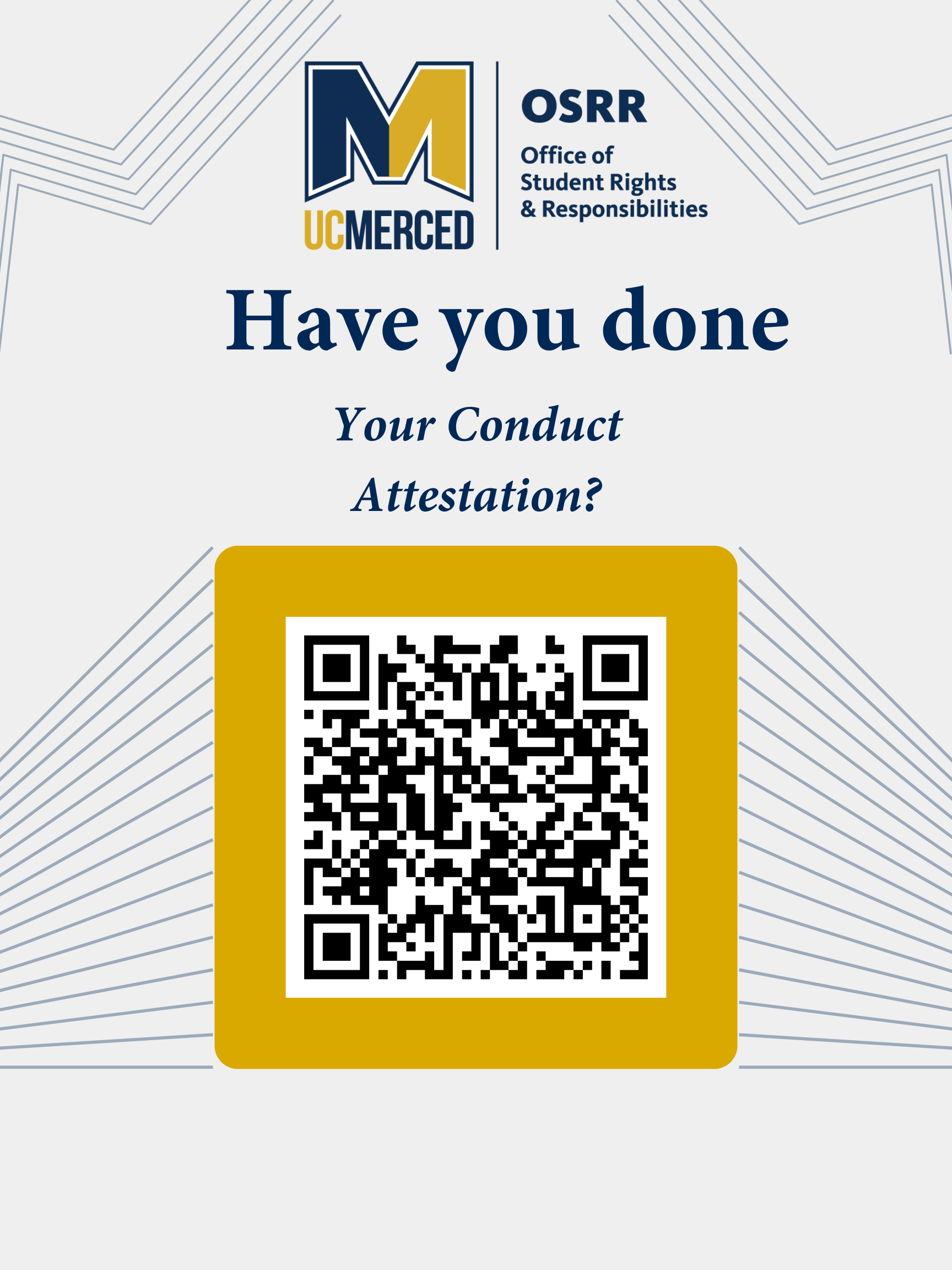Most cases are resolved through an Administrative Resolution process in which professional Student Conduct staff meet with the accused student, consult with the reporting party, and, if appropriate, enter a written disciplinary contract specifying agreed sanctions for any violations of conduct standards admitted to or found responsible for. Students are advised of their rights provided by UC Merced disciplinary procedures, including the right to an appeal (for sanctions not including suspension/dismissal) or a formal hearing (for sanctions of suspension/dismissal), and also to consult and be accompanied by an advisor during the Administrative Resolution and/or formal hearing processes. Cases that cannot be resolved through an Administrative Resolution process are heard by a student-faculty or student-staff panel, or by a hearing officer, in accordance with procedures described below and with requirements set forth in University policy.
Reporting Process
Jurisdiction
Administrative Resolution Process
Formal Fact Finding Hearing
Potential Sanctions
Appeals Process
Reporting Process
Suspected student misconduct falling within Student Conduct's jurisdiction should be reported in writing to the Office of Student Rights and Responsibilities. Reports should include the following, if known: the accused student's name and identifying information, the nature of the suspected violation, a description of the circumstances, including the date of the incident, names of witnesses, copies of supporting documents, and how to reach the reporting party. Report forms are available online or in the Office of Student Rights and Responsibilities.
Jurisdiction
The Office of Student Rights & Responsibilities (OSRR) has jurisdiction over various types of disciplinary violations, over students and student organizations, and over on- and off-campus incidents.
OSRR has jurisdiction over academic or non-academic misconduct by students that occurs on UC Merced property or in connection with campus functions, activities, equipment or facilities. OSRR also has jurisdiction over off-campus conduct and alleged crimes.
Student conduct that occurs off university property is subject to UC Merced Standards of Conduct where it 1) adversely affects the health, safety, or security of any member of the university community, or the mission of the university, or 2) involves academic work or any records, or documents of the university.
Administrative Resolution Meeting
"Administrative Resolution" means resolution without a formal fact-finding hearing, usually by agreement between the student and OSRR. It may also be a result of unilateral disciplinary action if a student fails to participate in the disciplinary process, or when a sanction is imposed as specified in a prior deferred sanction agreement. In cases where an Administrative Resolution cannot be agreed upon, the student has the right to appeal the outcome to the Director of the Office of Student Rights and Responsibilities or the right to request a formal fact-finding hearing if the sanctions in the Administrative Resolution meeting's outcome are suspension/dismissal.
Formal Fact Finding Hearing
A formal disciplinary hearing, consistent with the University's educational mission, is a process whereby members of our academic community — students, faculty, and staff — meet to make determinations of fact. It is not a court proceeding. The goal is to find the truth through a fair, prompt and effective process, respecting and preserving the rights of the accused student, the University community, the reporting party and any witnesses.
Potential Sanctions
The following disciplinary sanctions and administrative actions may be applied at UC Merced. Sanctions may be imposed, and administrative actions may be taken, separately or in combination.
- Dismissal: Termination of student status for an indefinite period (may not re-enroll in classes without approval from the Chancellor).
- Suspension: Termination of student status for a specified period of time (allowed to re-enroll at the end of that period).
- Interim Suspension: Exclusion of a student from classes, or other specified activities or areas of campus, before final determination of an alleged violation.
- Deferred Separation: A delayed imposition of suspension or dismissal.
- Loss of Privileges: Exclusion of a student from participation in designated privileges and activities for a specified period of time.
- Disciplinary Probation: A status imposed for a specific period of time during which a student must demonstrate conduct that conforms to university standards of conduct (may include restrictions on privileges or eligibility for activities).
- Censure, Warning, or Name on File: A written warning that a student has violated a specified University policy and that further violations may result in further disciplinary action.
- Restitution: Reimbursement for expenses incurred by the university or other parties resulting from a violation of University policies (may be monetary or appropriate service to repair or compensate for damages).
- Special Assignment: An assignment of costs, labor, duties, educational projects or other responsibilities that are appropriate based on the violation and/or student’s role on campus. Examples include: educational projects, research papers/personal essays, workshop/training, or community service.
Appeals Process
Appeals are available for formal fact‐finding hearings and for those who do not agree with the outcomes of the Administrative Resolution Process.
For Undergraduate Students: All appeals must be filed in writing within 10 days with the Vice chancellor of Student Affairs and Engagement and the Director of the Office of Student Rights and Responsibilities.
For Graduate Students: All appeals must be filed in writing within 10 days with the Designated Dean (or Assistant/Associate Dean) of the school.
Appeals must meet one of the following criteria:
- There is incongruity between the proposed sanction and the findings.
- There has been unfairness in the hearing proceedings.
- There is newly discovered important evidence that was not known at the time of the hearing or decision.
Results of appeals:
Appeals may be denied, granted in whole or part, or other options as appropriate.
For newly discovered evidence, the decision may be referred back to the hearing panel for reconsideration based on the new evidence.
Appeals for sanctions may be denied, sanctions may be increased, or other options (as appropriate) may be utilized.






